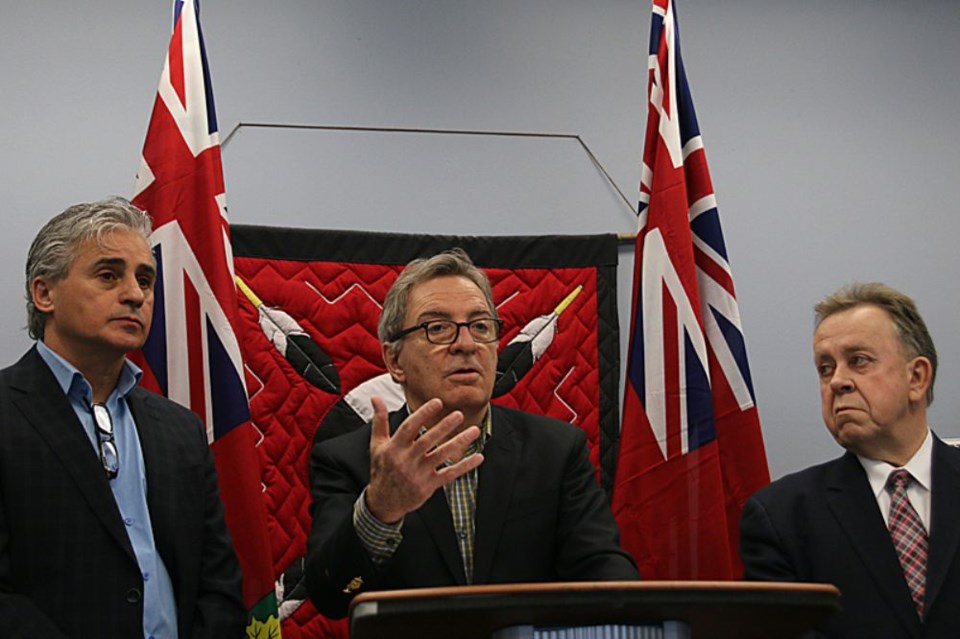THUNDER BAY – Whether it be shortened seasons for winter roads or flooding from late winter rainfalls, remote First Nations communities are experiencing the effects of climate change.
To help First Nations communities predict the impacts of climate change and how to manage them, the province is contributing $13 million for two initiatives to help indigenous communities address issue while also helping to support economic growth.
Aboriginal Affairs Minister David Zimmer made the announcement Thursday morning at the Ontario First Nations Technical Services Corporation office in Thunder Bay, while joined by local MPPs Northern Development and Mines Minister Michael Gravelle and Natural Resources Minister Bill Mauro.
The first initiative will see $5 million from the Green Investment Fund provided to the Ontario Centre for Climate Impacts and Adaptation Resources which will develop climate change adaptation plans to lead to the creation of a climate change impact study.
“Climate change is not something that’s here today and is going to get fixed in 12 months or 24 months. It’s an ongoing thing and an ongoing thing requires ongoing attention and resources to deal with it,” Zimmer said.
“The penny has dropped in everybody’s mind, I think. Climate change is here, climate change is going to be with us and we have to adapt to it. Adaptation is a process. A process is something that happens over time so we’re getting an early start.”
Laurentian University school of the environment professor David Pearson, who will be involved in working with a number of the communities, said one of the most difficult parts of creating the plans is finding historical weather data.
While it might be difficult to quantify the extent of climate change, there’s no doubt it’s happening.
“The projected trajectory of the winter roads is part of what’s very, very important. There will come a time when a community may not have a winter road season at all,” Pearson said.
In addition to the disappearing winter roads, the pattern of late winter rainfalls has also become problematic in many communities. Rain in March and April, when the ground is still frozen, creates the potential for flooding because the water can’t seep into the ground and just runs off into low lying areas.
The adaptation plans will allow the communities to determine what kind of conditions they expect and how best to prepare.
“How does a First Nation make itself more resilient? How can it cope better with likely floods and longer droughts that make the bush around them drier and more susceptible to fires?” Pearson said. “Does one look at an evacuation policy, does one look at cutting the bush around the community or putting in a fire break of some kind?”
Included in that funding is a component that will help First Nations communities learn about how they can leverage the province’s new cap and trade carbon emissions system to sell credits for economic development.
The second initiative is $8 million to lead to the development of advanced microgrid energy systems to help remote communities transfer off diesel fuel.
“There’s not enough time to get the diesel in (on winter roads). If you fly it in, it’s enormously expensive. It’s a pollutant and over and above those climate change pieces, it’s not fair for some communities to be not hooked up to the grid and everything the grid can bring in quality of life,” Zimmer said.
Wesley Bova, president of the Ontario First Nations Technical Services Corporation and Matawa Tribal Council technical services manager, said a number of communities have started exploring renewable energy sources.
Having an unreliable energy source, such as diesel, creates a multitude of other problems.
“When we have power outages in the remote north, and they always happen typically in inclement weather, it could have a detrimental impact on our water treatment plants if we don’t have backup power running sufficiently,” Bova said.
“We have significant issues in our water treatment plants in a number of our communities in the north so these issues compound each other when they occur.”
